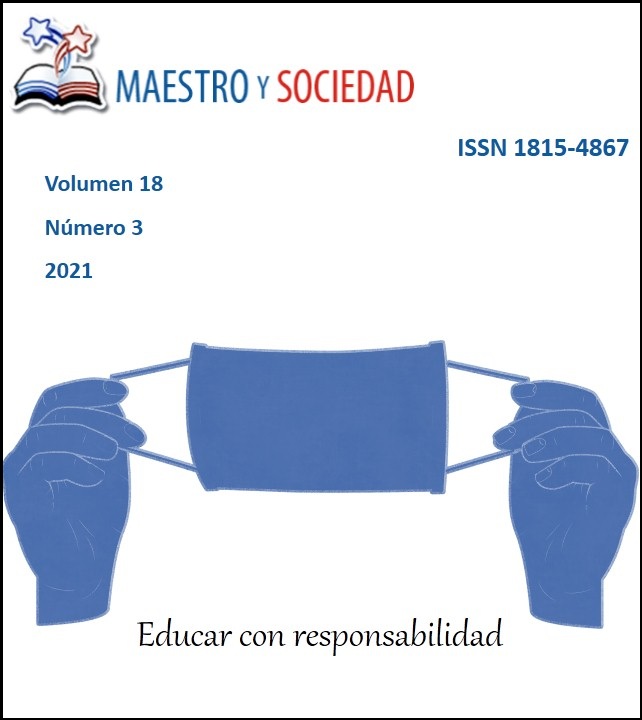Array Array
Array
Palavras-chave:
Array, ArrayResumo
ArrayReferências
2. Andrade, L., & Bedacarratx, V. (2018). Conceptos Ordenadores. 1, 15–34.
3. Chávez, W. O., Ortega, F. P., Pérez, J. K. V., Zúñiga, E. J. D., & Rivera, A. R. P. (2020). Modelo Ecológico de Bronfenbrenner aplicado a la pedagogía, modelación matemática para la toma de decisiones bajo incertidumbre: de la Lógica Difusa a la Lógica Plitogénica. In Journal of Chemical Information and Modeling 53(9).
4. Chiavenato, I. (2019). Administración de Recursos Humanos.
5. Edgar Morin. (2019). Introducción al pensamiento Complejo. Recuperado de http://ulima.summon. serialssolutions.com/2.0.0/link/0/eLvHCXMwY2AwNtIz0EUrE4Dpy
6. Flores, F. A. S. (2019). Fundamentos Epistémicos de la Investigación Cualitativa y Cuantitativa : Consensos y Disensos. 13, 102–122.
7. Garza-Trevi, R. S. (2019). Etapas de la administración : hacia un enfoque sistémico. 87, 139–154.
8. Lis, G. (2013). La concepción de sujeto como elemento de pronóstico de las instituciones socializadoras .
9. Montenegro, G. (2020). Dimensiones del pensamiento sistémico aplicado: un estudio de casos múltiple desde la perspectiva de sistemas complejos y el aprendizaje organizacional. Psicología, Conocimiento y Sociedad, 10(2), 74–100.
10. Ortega, W., et. al. (2020). Investigar y Reaprender con Modelos Sistémicos. In W. O. Chávez (Ed.), Investigar-reaprender con modelos sistémicos. https://doi.org/http://isbn.bnp.gob.pe/ catalogo.php?mode=detalle&nt=110803
11. Osorio Gómez, J. C. (2008). Introducción al pensamiento sistémico. Introducción Al Pensamiento Sistémico, 1–14. https://doi.org/10.25100/peu.88
12. Páez-cala, M. L. (2019). Intervención sistémica con familias : de la linealidad.
13. Ríos Hidalgo NP, Martínez Martínez-Díaz G, A. M. J. (2020). Sistema de superación con enfoque interdisciplinario para los docentes de Anatomía Patológica de la carrera de Medicina. 15(1), 26–34.
14. Rojero, F. F. (2018). Fundamentos Conceptuales Y Didácticos. Enfoque Sistémico, 10(10.2), 134–143.
15. Russell. Ackoff. (2016). Paradigma de Ackoff una administración sistémica.
16. Senge, P. (2020). Peter Senge La Quinta Disciplina.
Publicado
Como Citar
Edição
Seção
Licença
Esta revista proporciona un acceso abierto inmediato a su contenido, basado en el principio de que ofrecer al público un acceso libre a las investigaciones ayuda a un mayor intercambio global de conocimiento. Cada autor es responsable del contenido de cada uno de sus artículos. Los artículos pueden ser inéditos o estar disponibles previamente en servidores de preprints reconocidos por la revista. Sin embargo, no se permite la duplicación de la publicación o traducción de un artículo ya publicado en otra revista o como capítulo de un libro.
This journal provides immediate open access to its content, based on the principle that providing the public with free access to research supports a greater global exchange of knowledge. Each author is responsible for the content of each of their articles. Articles may be previously unpublished or available on preprint servers recognized by the journal. However, duplication of publication or translation of an article already published in another journal or as a book chapter is not permitted.
Esta revista oferece acesso aberto imediato ao seu conteúdo, com base no princípio de que oferecer ao público acesso gratuito à pesquisa contribui para um maior intercâmbio global de conhecimento. Cada autor é responsável pelo conteúdo de cada um de seus artigos. Os artigos poderão ser inéditos ou estar previamente disponíveis em servidores de preprints reconhecidos pela revista. No entanto, não é permitida a duplicação de publicação ou tradução de artigo já publicado em outro periódico ou como capítulo de livro.



























 Universidad de Oriente
Universidad de Oriente 